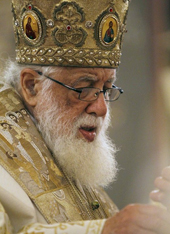Anti-discrimination bill causes confrontation
By Messenger Staff
Tuesday, May 20




It was very well known that in the process of Euro-integration Georgia should have adopted anti-discrimination legislation. However, the process was conducted in an accelerated manner and it became the reason for bitter confrontation.
Georgian parliamentary members justified this step by saying that this is the demand of the EU and Georgia has no chance to continue with its European integration, visa liberalization and access to the EU market if it does not adopt this bill. However, the situation was further aggravated because officials ignored the proposal of the Orthodox Church to carry out an open dialogue before its adoption.
The Georgian Orthodox Church asked to delay adoption of the draft law and to take out several formulas of the text about the sexual orientation and gender identity. The parliament refused.
Both political forces represented in the parliament – the Georgian Dream administration and the oppositional United National Movement (UNM) were unanimous in this direction. Several MPs stated that the church should not interfere in politics. They mentioned that they are politicians, and that elected officials are the ones who make these decisions in the country.
But the reality is that Patriarch Ilia II always holds the top position in any polling, and the claim of the politicians that they should make decisions themselves sounds comic as their rating has always been lower than that of the patriarch.
As a result, adoption of the draft law in this manner seriously deteriorated the relations between the Georgian Dream and the Orthodox Church.
Although the Prime Minister, the Parliamentary Chairperson and many leading politicians who supported the new legislation expressed their utmost respect towards the Christian-Orthodox Church and the patriarch himself, it did not relax the situation.
After adoption of the anti-discrimination legislation everybody in Georgia who was anticipating tension because of the forthcoming May 17 International Day Against Homophobia many suppose that gay parades and similar demonstration could take place on that day and that would be a test for the new legislation.
Despite the fact that on May 17, LGBT supporters did not plan any rallies, the Orthodox Church and the parish still took some preventive steps. For instance, a week prior to May 17, Patriarch Ilia II said every year on this date Georgia should celebrate “respect towards family and parents.” According to him, the church should carry out services on that day and give blessings to families, churches and the streets.
At the same time on May 17 the congregation of the community leaders and other similar organizations held a peaceful rally on the central avenue in Tbilisi demanding to take out the terms “sexual orientation” and “gender identity” from the anti-discrimination bill. The participants of the rally demanded to adopt the law, which should ban both direct and indirect homosexuality “propaganda” in Georgia.
Meanwhile, on May 17 the Georgian Patriarchate once again reiterated that it condemns “unnatural and perverse” relations. It also recommended to the believers to ensure peaceful demonstration as the church is against violence.
Identoba, which protects the rights of the LGBT community has stated multiple times that it did not plan any kind of activities targeted against homophobia and transphobia and thus would not celebrate May 17.
Identoba also stated that the current events in Georgia should be understood as the part of the process of signing the association agreement between Georgia and the EU. According to Identoba, some pro-Russian individuals are trying to mobilize people against European integration and homophobia was a good way to exploit that.
Of course this issue considerably influences the overall political situation in the country. The EU and its supporters are associated with LGBT people and this does not increase its popularity at all.
This position increases anti-European sentiments and promotes pro-Russian ideas mainly discrediting the pro-western position.
It is interesting that this topic has been widely exploited a month prior to the local self-government elections. Some representatives of clergy openly say that the Georgian Dream administration received the support of the Georgian church in the parliamentary elections in November, 2012 but it will not be the case again this time. Although the coalition plans to win the elections, anti-discrimination legislation in its current wording does not facilitate its victory.
